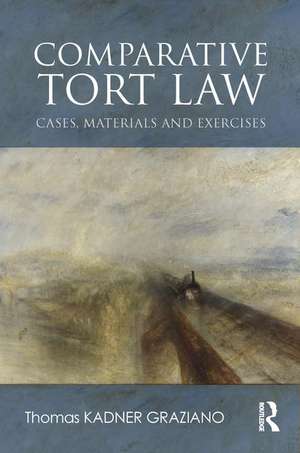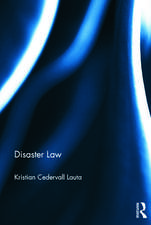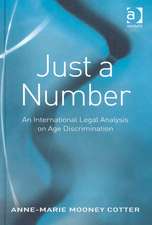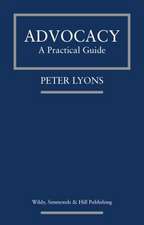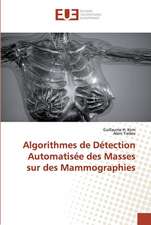Comparative Tort Law: Cases, Materials, and Exercises
Autor Thomas Kadner-Grazianoen Limba Engleză Paperback – 27 mar 2018
• solve the proposed scenario according to the laws of several jurisdictions;
• compare the approaches and solutions they have identified;
• evaluate their respective pros and cons; and
• reflect upon the most appropriate approach and solution.
This book is essential reading for all students and scholars of comparative tort law and comparative law methodology and is the ideal companion for those wishing to both familiarise themselves with real-world materials and understand the many diverse approaches to modern tort law.
| Toate formatele și edițiile | Preț | Express |
|---|---|---|
| Paperback (1) | 295.13 lei 3-5 săpt. | +45.69 lei 6-12 zile |
| Taylor & Francis – 27 mar 2018 | 295.13 lei 3-5 săpt. | +45.69 lei 6-12 zile |
| Hardback (1) | 1136.01 lei 6-8 săpt. | |
| Taylor & Francis – 29 mar 2018 | 1136.01 lei 6-8 săpt. |
Preț: 295.13 lei
Nou
Puncte Express: 443
Preț estimativ în valută:
56.48€ • 60.39$ • 47.09£
56.48€ • 60.39$ • 47.09£
Carte disponibilă
Livrare economică 27 martie-10 aprilie
Livrare express 12-18 martie pentru 55.68 lei
Preluare comenzi: 021 569.72.76
Specificații
ISBN-13: 9781138567733
ISBN-10: 1138567736
Pagini: 650
Ilustrații: 18 Tables, black and white; 5 Illustrations, black and white
Dimensiuni: 174 x 246 x 43 mm
Greutate: 1.05 kg
Ediția:1
Editura: Taylor & Francis
Colecția Routledge
Locul publicării:Oxford, United Kingdom
ISBN-10: 1138567736
Pagini: 650
Ilustrații: 18 Tables, black and white; 5 Illustrations, black and white
Dimensiuni: 174 x 246 x 43 mm
Greutate: 1.05 kg
Ediția:1
Editura: Taylor & Francis
Colecția Routledge
Locul publicării:Oxford, United Kingdom
Public țintă
Undergradute lawCuprins
Preface
Acknowledgements
Translations
List of abbreviations
PART A Introduction
Chapter 1 Tort law in the 21st century – the purpose of this book
Chapter 2 A case-oriented and multilateral approach to the teaching, studying, and learning of comparative law: the approach used in this book
Chapter 3 Is it legitimate and beneficial for judges to compare?
Chapter 4 The Principles of European Tort Law – a brief introduction and analysis
PART B Case studies
Chapter 5 Conditions and limits of extra-contractual liability – cable cases
Chapter 6 Fault-based liability and the required standard of care: the case of damage caused by minors
Chapter 7 Fault-based liability in action: challenges of establishing fault (and alternative regimes) – the example of sports accidents
Chapter 8 Liability without fault – a ruptured water main: casum sentit dominus?
Chapter 9 Most common cases: traffic accidents
Chapter 10 Liability in cases of uncertain causation – "all or nothing" or partial compensation in relation to the probability of causation?
Chapter 11 Damage suffered by secondary victims: the case of psychiatric injury, "nervous shock", or "post-traumatic stress disorder (PTSD)" following the loss or severe injury of a loved one
Chapter 12 Damage suffered by secondary victims: damages for pure emotional harm following the loss or severe injury of a loved one
Chapter 13 Liability for others – the case of liability of parents for damage caused by their children
Chapter 14 Pure economic loss: the case of liability for wrongful information and advice
Chapter 15 Protection of privacy and the purposes of tort law
Chapter 16 Damage to public goods: the case of damage to the environment, pure ecological damage in particular
Chapter 17 Comparative tort litigation – an introduction, with a focus on the costs of lawsuits
Chapter 18 Cross-border torts: coordinating legal diversity through Private International Law – an introduction
Chapter 19 Epilogue: tort law in context – and potential alternatives to tort liability
Table of codal and statutory provisions
Index
Acknowledgements
Translations
List of abbreviations
PART A Introduction
Chapter 1 Tort law in the 21st century – the purpose of this book
Chapter 2 A case-oriented and multilateral approach to the teaching, studying, and learning of comparative law: the approach used in this book
Chapter 3 Is it legitimate and beneficial for judges to compare?
Chapter 4 The Principles of European Tort Law – a brief introduction and analysis
PART B Case studies
Chapter 5 Conditions and limits of extra-contractual liability – cable cases
Chapter 6 Fault-based liability and the required standard of care: the case of damage caused by minors
Chapter 7 Fault-based liability in action: challenges of establishing fault (and alternative regimes) – the example of sports accidents
Chapter 8 Liability without fault – a ruptured water main: casum sentit dominus?
Chapter 9 Most common cases: traffic accidents
Chapter 10 Liability in cases of uncertain causation – "all or nothing" or partial compensation in relation to the probability of causation?
Chapter 11 Damage suffered by secondary victims: the case of psychiatric injury, "nervous shock", or "post-traumatic stress disorder (PTSD)" following the loss or severe injury of a loved one
Chapter 12 Damage suffered by secondary victims: damages for pure emotional harm following the loss or severe injury of a loved one
Chapter 13 Liability for others – the case of liability of parents for damage caused by their children
Chapter 14 Pure economic loss: the case of liability for wrongful information and advice
Chapter 15 Protection of privacy and the purposes of tort law
Chapter 16 Damage to public goods: the case of damage to the environment, pure ecological damage in particular
Chapter 17 Comparative tort litigation – an introduction, with a focus on the costs of lawsuits
Chapter 18 Cross-border torts: coordinating legal diversity through Private International Law – an introduction
Chapter 19 Epilogue: tort law in context – and potential alternatives to tort liability
Table of codal and statutory provisions
Index
Recenzii
"This is the first true student reader on comparative tort law bringing together excerpts from court practice and legislation in a way that lets students experience comparative law in action. It leaves room for one’s own opinion, which is crucial for comparative legal education."
Bernhard A. Koch, Univ.-Prof. Dr. LL.M., Universität Innsbruck
"Thomas Kadner Graziano’s new book applies a broad comparative approach that prepares students for the challenges of the modern world. Written in English, it can be used in classrooms around the world. The book provides students with an excellent opportunity to develop their skills as comparative lawyers."
Reinhard Zimmermann, Prof. Dr. Dr. h.c. mult., Direktor am Max-Planck-Institut für ausländisches und internationales Privatrecht, Hamburg
"Worldwide comparative law is of increasing importance. Therefore, Kadner Graziano’s idea to provide materials for teachers and students for a case oriented approach to comparative law methodology, taking as an example tort law, is highly welcome. It will greatly benefit every user to go through this book thoroughly."
Helmut Koziol, Prof. Dr. Dr. h.c., founding President of the European Center of Tort and Insurance Law, Vienna
Bernhard A. Koch, Univ.-Prof. Dr. LL.M., Universität Innsbruck
"Thomas Kadner Graziano’s new book applies a broad comparative approach that prepares students for the challenges of the modern world. Written in English, it can be used in classrooms around the world. The book provides students with an excellent opportunity to develop their skills as comparative lawyers."
Reinhard Zimmermann, Prof. Dr. Dr. h.c. mult., Direktor am Max-Planck-Institut für ausländisches und internationales Privatrecht, Hamburg
"Worldwide comparative law is of increasing importance. Therefore, Kadner Graziano’s idea to provide materials for teachers and students for a case oriented approach to comparative law methodology, taking as an example tort law, is highly welcome. It will greatly benefit every user to go through this book thoroughly."
Helmut Koziol, Prof. Dr. Dr. h.c., founding President of the European Center of Tort and Insurance Law, Vienna
Descriere
This book promotes a learning by doing approach to comparative tort law. Students are invited to solve a scenario according to the laws of several jurisdictions and to reflect upon the most appropriate approach and solution.
